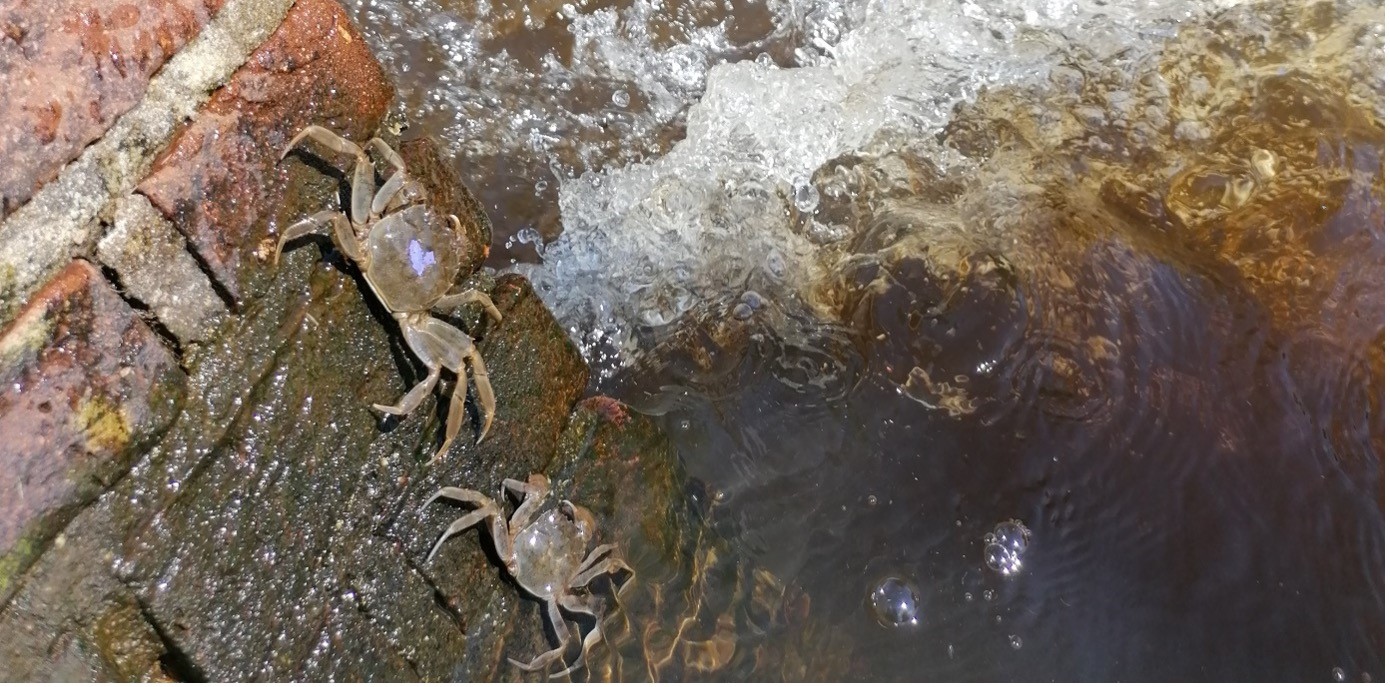‘Invasive Species’ programme

Chinese mitten crab (photo INBO)
Details
...Invasive alien species are species introduced by human activity that spread rapidly in the environment, often causing damage or nuisance. They combine various effects at the interface between human, animal and plant health and the environment.
Some well-known examples are Japanese knotweed, giant hogweed, the Asian hornet, the Chinese mitten crab and Reeve's muntjac. The socio-economic impact of invasive species is high, both in terms of direct damage and indirect (management) costs. The annual costs for Europe have been conservatively estimated at 12 billion euros. As a logistical and economic hub, Flanders is an invasion hotspot and the economic cost is expected to be correspondingly high. Invasive alien species can lead to increased risks to ecology, the economy and public health, and require a tailored approach. Flanders has been investing in the management of invasive species for some time, and for land managers, the control of invasive species in nature reserves, public green spaces, watercourses and the public domain is a daily practice.
The European Regulation on invasive alien species (EU Regulation 1143/2014) aims to limit the introduction, spread and impact of invasive alien species in Europe. The regulation is ambitious and covers measures ranging from prevention to management for a wide range of species on the so-called Union list, the list of invasive alien species of Union concern. Following a third update of the list in 2022, there are now 88 invasive species on the list. In 2025, a proposal for 30 additional species will be put to the vote. At least 46 of these have already been observed in Flanders and populations of 28 species are already established (nature report, PrIUS report). The numbers continue to rise year after year. The EU Regulation imposes a number of obligations on Flanders in terms of prevention and management. At the same time, it sets reporting obligations, which will come into force in 2025. INBO operates within the framework of a cooperation agreement with other Belgian authorities and co-finances the National Scientific Secretariat for Invasive Alien Species.
One of the objectives of the “invasive alien species” programme is to enable an integrated multi-annual approach for priority invasive alien species in Flanders. The programme therefore supports field actions by facilitating cooperation between all relevant actors, with the aim of increasing the effectiveness and cost-efficiency of monitoring and control. In addition, the programme contributes to efficient knowledge sharing and coordination of initiatives on species policy and the control of priority invasive alien species.
There are five main pillars within this programme:
- Monitoring, surveillance and open data (pillar 1). These are all actions to detect the introduction of invasive species, monitor their spread and trends, and make data accessible to managers and researchers. INBO is developing a monitoring framework and methods for this purpose and sharing its knowledge with other actors. Passive surveillance with citizen science is an important component of this, complementing professional monitoring. Within this pillar, INBO maintains a register with information on introduction pathways, publishes as many open datasets as possible, and invests in portal sites to make them accessible. To this end, INBO collaborates with other Belgian institutions and supports reporting to Europe.
- Risk management and management evaluation (pillar 2). Managers need feasible and meaningful management measures that are scientifically substantiated. These provide basic information for decisions on management, codes of good practice, innovative techniques, population-ecological impact and the (cost) effectiveness of management measures. This knowledge is exchanged in networks with managers, policymakers and scientists. The registration of management measures is an important activity in this pillar and is linked to the reporting obligations of the EU Regulation.
- Impact and risk analysis (Pillar 3) is closely linked to the previous pillars. It involves detecting trends, predicting which species we can expect in the future, for example under the influence of climate change, and what impact they may have on biodiversity. INBO fulfils this pillar through horizon scans, risk assessments and ad hoc recommendations.
- System-oriented research into the resilience of ecosystems (pillar 4). Problems with invasive species are often a symptom of poor environmental quality or arise after interventions in habitats and ecosystems. A holistic, process-oriented approach offers opportunities to mitigate invasions by making ecosystems more resilient. For this research, we are primarily looking to collaborate with universities (e.g. doctoral research), foreign institutions and networks.
- Human dimensions of biological invasions (pillar 5). Humans are usually at the root of the problem of biological invasions, but at the same time they are also part of the solution. Stakeholder involvement is an important prerequisite for successful prevention and management. Understanding the perceptions of stakeholders requires research into the human dimensions of biological invasions. For this research, we are also focusing on collaboration with foreign institutions and networks.
| Status | Running |
|---|---|
| Actual start/end date | 01/11/2018 - 31/12/2029 |
Teams
- Genetic Diversity
- Open science lab for biodiversity
- Wildlife Management and Invasive Species
- Nature & Society
- Management Team
- Biometry, Methodology and Quality Assurance
- Biotope Diversity
- Forest Ecology and - Management
- Landscape Ecology and Nature Management
- Communication and Planning
- Own Capital INBO
- Estuaries
- Environment and Climate
- Nature Report and Advice Coordination
- Freshwater Habitats
- Monitoring and Restoration of Aquatic Fauna
INBO Research theme(s)
- Invasive species
Participants
Soria DelvaDiederik Strubbe
Janne Adolf
Veronique Adriaenssens
Rein Brys
Emma Cartuyvels
Wietse Chanet
Myriam Dumortier
Teun Everts
Rhea Maesele
Damiano Oldoni
Robbe Paredis
Fleur Petersen
Lien Reyserhove
Maud Segal
Geert Sioen
Vincent Smeekens
Jan Soors
Toon Spanhove
Jeroen Speybroeck
Frédérique Steen
Sanne Van Donink
Charlotte Van Driessche
Bart Vandevoorde
Margot Vanhellemont
Inne Vught
Loïc van Doorn
Tim Adriaens
Marc Pollet
Kevin Scheers
Jim Casaer
Yasmine Verzelen
Sander Devisscher
Frank Huysentruyt
Jo Packet
Hugo Verreycken
Jasmijn Hillaert
Bram D'hondt
